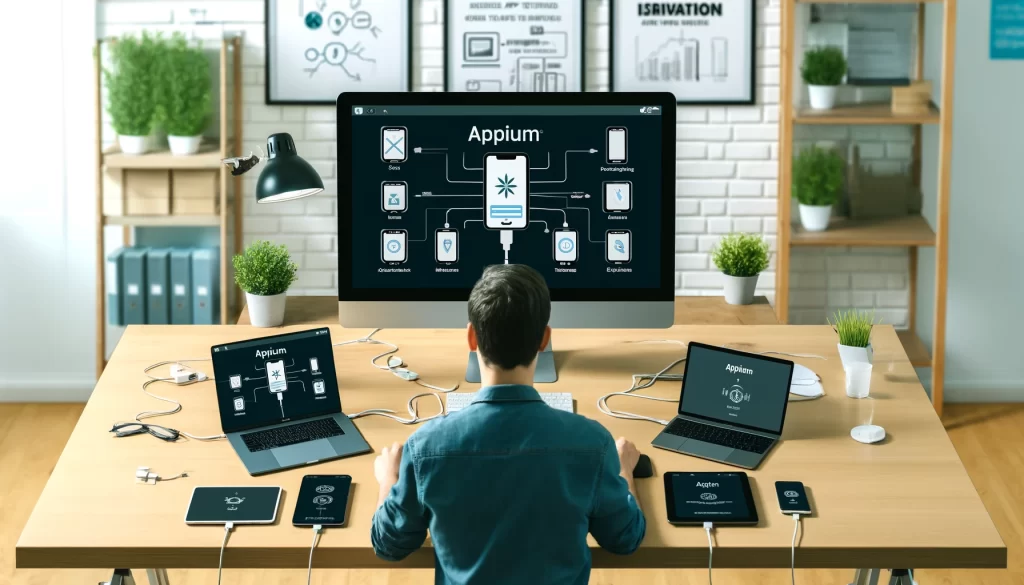Introduction
Appium is a versatile tool for automating mobile applications on various platforms such as iOS and Android. To maximize testing efficiency and flexibility, you might need to run Appium on multiple ports on the same host. This setup can be particularly useful when testing scenarios involve communication between two different mobile apps. In this article, we will discuss how to use Appium on two different ports and explore the purposes and advantages of such a configuration.
Purpose of Using Appium on Multiple Ports
- Parallel Testing: Running multiple Appium servers on different ports allows for parallel execution of tests, speeding up the testing process.
- Testing Inter-App Communication: Facilitates testing scenarios where two different mobile applications need to communicate with each other.
- Resource Utilization: Better utilization of machine resources by running multiple instances of Appium.
- Isolation of Tests: Isolates tests for different applications or test cases to avoid interference.
- Scalability: Makes it easier to scale the testing infrastructure without requiring multiple physical hosts.
Setup Guide for Using Appium on Multiple Ports
Prerequisites
- Appium Installed: Ensure Appium is installed on your host.
- Node.js Installed: Appium requires Node.js, so make sure it is installed.
- Devices or Emulators: Connected devices or configured emulators.
- Automation Scripts: Test scripts ready to be executed.
Steps to Set Up Appium on Multiple Ports
Starting Appium on Different Ports
Install Appium and Node.js :
npm install -g appium
npm install -g appium-doctor
Start Appium Server on Port 4723 :
appium -p 4723
Start Another Appium Server on Port 4724 :
appium -p 4724
Example Configuration
Test Script for App A (Port 4723) & App B (Port 4724)
import io.appium.java_client.AppiumDriver;
import io.appium.java_client.MobileElement;
import io.appium.java_client.android.AndroidDriver;
import org.openqa.selenium.remote.DesiredCapabilities;
import java.net.URL;
public class TestAppA {
public static void main(String[] args) {
DesiredCapabilities caps1 = new DesiredCapabilities();
caps1.setCapability("deviceName", "Device_A");
caps1.setCapability("platformName", "Android");
caps1.setCapability("app", "/path/to/appA.apk");
DesiredCapabilities caps2 = new DesiredCapabilities();
caps2.setCapability("deviceName", "Device_B");
caps2.setCapability("platformName", "Android");
caps2.setCapability("app", "/path/to/appB.apk");
try {
AppiumDriver<MobileElement> driver1 = new AndroidDriver<>(new URL("https://localhost:4723/wd/hub"), caps1);
AppiumDriver<MobileElement> driver2 = new AndroidDriver<>(new URL("https://localhost:4724/wd/hub"), caps2);
// Your test logic for App A here
// Your test logic for App B here
driver1.quit();
driver2.quit();
} catch (Exception e) {
e.printStackTrace();
}
}
}
Advantages of Using Appium on Multiple Ports
- Comprehensive Testing: Validates the complete flow of interaction between two apps, ensuring end-to-end functionality.
- Improved Coverage: Tests real-world scenarios where two apps communicate over different devices and networks.
- Efficiency: Parallel execution of tests reduces the overall testing time.
- Scalability: Easily add more hosts and devices to test multiple inter-app communication scenarios.
- Robustness: Identifies and isolates issues in inter-app communication, ensuring higher reliability and user satisfaction.
Conclusion
Running Appium on multiple ports provides a flexible and efficient way to perform parallel testing, especially when dealing with inter-app communication scenarios. By following the setup guide provided in this article, you can configure Appium to run on different ports and leverage these advantages to enhance your mobile application testing strategy. This setup not only increases testing efficiency but also improves resource utilization and test isolation, making it an ideal approach for comprehensive mobile testing.


You have a true talent for writing.